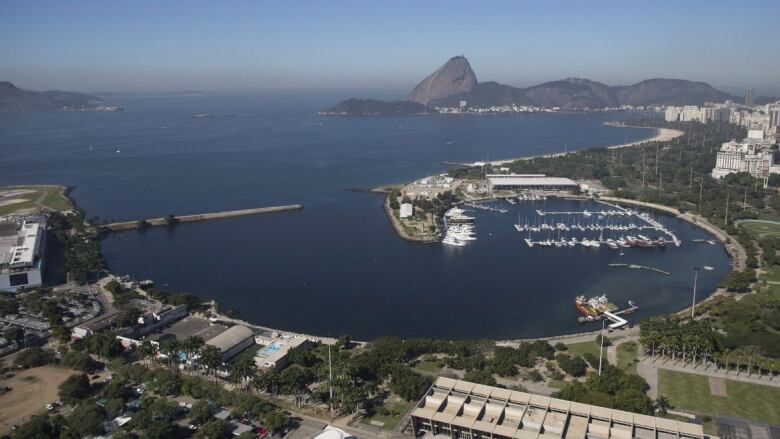Canada's Olympic sailors preparing for Rio's troubled water
Contaminated water gives athletes reasons to worry

By Neil Davidson, The Canadian Press
Dannie Boyd says the view of Rio from the Olympic sailing course is incredible.
"It really makes for picturesque photos," said the 26-year-old from Kingston, Ont., who is racing in the women's 49er FX class with Erin Rafuse of Halifax.
"Spectacular," echoed Nikola Girke, a 38-year-old from West Vancouver who competes in the Nacra 17 class with Luke Ramsay of Vancouver. "One of the most beautiful places to sail. Just looking around, I think the city is so much more beautiful from the water than it looks on land."
But the water below is a different story. Dangerously high levels of viruses and bacteria from sewage have been documented while an oil slick turned white boats brown prior to the Games.
'Don't put your head under water'
On Monday, The Associated Press reported that the water was as filthy as ever, contaminated with raw human sewage teeming with dangerous viruses and bacteria.
Tests commissioned by The AP show some 1,400 athletes are at risk of getting violently ill in water competitions.
In light of the findings, biomedical expert Valerie Harwood had one piece of advice: "Don't put your head under water."
The Gloria Marina, the starting point for the sailing races, is among the most contaminated points, according to AP.
Girke, who is competing in her fourth Olympics, said it's "definitely the worst I've seen in all my life and travels.
"It is disturbing and it is something we all have to deal with. I think it's really sad. You'd hope that one of the legacies from the Olympic Games, from Rio, would be cleaner water — something for their people. And that hasn't happened."
Canadian triathlete Kirsten Sweetland said she and teammates took antibiotics as a precaution when they swam in Rio last year.
"Our events at Copacabana Beach. It's not where the sailing and the rowing is," Victoria's Sweetland said. "It's open ocean, hundreds of thousands of people swim there every year, it's a big iconic beach. I think the risk is relatively low in triathlon compared to some of those other sports that are in the more stagnant water. Being an open-water sport there's always a risk. I got sick in one of the most clean countries in the world, so it's no more of a risk than any other time we jump in the water."
AP's tests suggest the water at the city's famous beaches is also contaminated. In addition to persistently high viral loads, the beaches often have levels of bacterial markers for sewage pollution that would be cause for concern abroad, and sometimes exceed Rio state's lax water safety standards, AP reported.
Boyd says she and Rafuse are in one of the boats "most likely to get wet."
"The water quality is definitely a struggle," said Boyd. "We've taken precautions to make sure that we stay safe in it.
"Learning a couple of new techniques to make sure our mouths stayed close," she added with a laugh.
Precautions being taken
Hand sanitizers and anti-bacterial wipes are a must, especially before eating or drinking.
Girke counts herself fortunate that one of their sponsors, the K3 Company, makes waterproof gear bags.
Everything is kept in those bags in an attempt to protect them from the polluted water.
"Obviously during sailing, we have to talk to each other," said Girke. "Water splashes us. We are covered in water all day long. If it comes near your mouth or in your mouth, I spit a lot. And just try to be healthy otherwise."
The sailors have also had been vaccinated.
"You take as much precautions as you can but you've still got to keep living," Girke said.
With files from The Associated Press and Joshua Clipperton